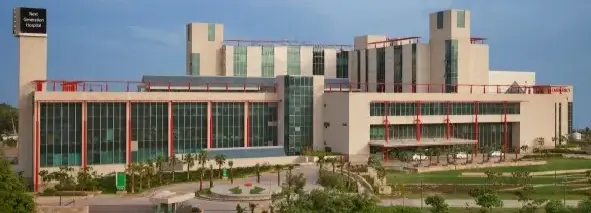Best HSCT Hospitals and Medical Centers across the World
HSCT stops Multiple Sclerosis. It is a new promising treatment therapy that offers quality life to patients diagnosed with MS.
Multiple Sclerosis is a progressive, immune-mediated disorder that mistakenly attacks parts of the body that are vital for everyday function. According to Healthline, “As a result of MS progression, the protective covering of nerve cells get damaged which then leads to diminished function in the brain and spinal cord. Some people with severe MS may even lose the ability to walk independently.”
Although Multiple Sclerosis is a non-life-threatening disorder, its progression inevitably leads to impairment of the patient’s ability to move.
About the possible causes of the condition, National MS Society has pointed that though the exact cause of MS is not known yet, scientists and researchers believe that MS is triggered by a combination of factors that includes immunology, epidemiology, genetics and infectious agents.
Multiple Sclerosis Treatment Options
Despite medical advancement, there’s still no cure for Multiple Sclerosis however, certain treatments can help patients to modify the course of the disease and manage symptoms.
It has been proven that the conventional therapies do not provide satisfactory control of Multiple Sclerosis the way HSCT does. Hormonal therapy too helps to limit acute manifestations of the disease, but it cannot completely stop its progression. Interferon therapy, on the other hand, may help some patients, but in most cases, it does not provide a stable long-term effect.
For the last couple of years, HSCT for MS has received a lot of attention as it has given people with Multiple Sclerosis new hope in halting their disease progression and leading a longer and quality life.
As of now it is the only existing and proven treatment that arrests the progression of the disease.
Dr Burt’s Experiment with HSCT
Dr Burt at North Western University, Chicago, started working with HSCT treatment in 1996. Prior to that, he was a Fellow working at Johns Hopkins Hospital in Baltimore.
While working there, he realised that when diseased cells lose their memory perhaps it would be possible to re-program them with ‘good’ memories. He then started using patients’ own basic cells (Autologous) – these special type of cells have two important properties. They are able to make more cells like themselves and they self-renew. For patients with autoimmune conditions like Multiple Sclerosis, CIDP etc. – this HSCT therapy worked to stop further progression of disease as explained below
He tried out his idea on animals in the research lab and—it worked!
Now, its been two decades and Dr. Burt still continues to hone the procedure. Along with his team of researchers at Northwestern University, he is using this technique to treat MS patients.
How HSCT Therapy Works

As mentioned earlier, HSCT is the only proven treatment that stops the progression of MS.
HSCT resets the faulty immune system and halts the progression of multiple sclerosis. HSCT has been described as a ‘re-boot’ for the immune system.
Resultantly, the new immune system has no cell memory of malfunction and therefore, no longer attacks the nerves (Myelin.)
This rebooting is done using a mild dose of chemotherapy. When administering chemotherapy during HSCT the doses are short and targeted though. Therefore, this period lasts for only a few days.
Post therapy, patients remain vulnerable to infections for approximately six months after the transplant, though some viral infections can occur later. They are thus given preventative antibiotics and antiviral medications for up to 12 months after the transplant.
As a precautionary measure, patients are also advised to observe food and hand hygiene, avoid crowds and situations where they may catch an infection.
They would need to continue under the care of a haematologist after the transplant, either in a hospital or in their home country.
Till date, more than 5,000 patients have been treated for MS worldwide. The number continues to rise every day. However, the criteria to determine whether you qualify for treatment varies with each facility.
Myeloablative HSCT vs. Non-Myleoblative HSCT
There are two ways HSCT wipes out the memory of the immune system – completely or partially. These are also called as Myeloablative HSCT, the harsher treatment that thoroughly deletes the memory and Non-Myleoblative HSCT that only partially removes the memory of the immune system.

The treatment stops the underlying MS disease activity and progression.
Once the Chemotherapy ends, preparation of the thawed and newly harvested cells begins. The next part of the procedure is to reintroduce them to the body. This is similar to a blood transfusion.
Before going ahead with HSCT treatment, it is important to understand which type of HSCT (Myeloablative or Non-Myeloablative) is best suited for you and which facility around the world is best to treat your MS.
HSCT for autoimmune diseases has been performed throughout the world for almost three decades. The very first procedures were performed in the early nineties. The procedure has been finessed considerably since its first inception and customised in different ways.
Here’s an exhaustive list of facilities that offer HSCT for MS and other Autoimmune diseases around the world.
1. North Western Memorial Hospital Chicago: This is the centre where Dr. Burt (considered the father of HSCT) treats MS patients. The centre carries maximum number and types of transplants, averaging over 350 transplantations annually, resulting in survival rates that consistently exceed the national rates.
2. Sheffield Teaching Hospitals NHS Foundation Trust, UK: The dedicated clinical research and innovation office provides hands-on support and advice to members of the public and patients on how their cutting-edge facilities can improve health and healthcare for patients living in Sheffield and beyond.
3. The A.A. Maximov Hematology and Cell Therapy Department of the National Pirogov Medical Surgical Centre in Russia: The centre specialises in the state-of-the-art treatment of haematological, oncological and autoimmune diseases. The cost of treatment in Russia is less expensive than in the US. Patients stay in the A.A Maximov Clinic in Moscow for a month, until they are well enough to travel. The treatment is led by Russian haematologist Dr. Denis Fedorenko. The Maximov Facility in Russia regularly treats progressive cases.
4. Heidelberg University Hospital, Germany. With over 300 transplantations per year, you will find one of the largest and most prestigious centres for haematology, oncology, and rheumatology in Europe. The hospital has a highly specialised team of physicians and scientists under the direction of Professor Dr. Carsten Müller-Tidow who has extensive experience especially in the treatment of multiple myeloma, leukaemia, and lymphoma.
5. The UCT Private Academic Hospital (UCTPAH), South Africa : The hospital is an innovative collaboration between the Private Healthcare Sector (Netcare), the University of Cape Town’s Medical School and the Groote Schuur Hospital. Based on best available medical evidence, treatment plans are individualised for patients to offer them optimal clinical management. The specialists are, thus, able to offer focused treatment for all phases and stages of the disease. The physicians use the latest clinical techniques and resources to harvest cells. By manipulating cell grafts, they also modify immunity. Dedicated facilities include a 6-bed unit for patients undergoing transplant, which offers ICU beds and special HEPA filtration systems to reduce the risk of infection.
6. Shaare Tsedek Medical Center, Jerusalem, Israel : The medical centre combines extensive experience with cutting edge medical technologies. The centre is known worldwide for its cutting edge HSCT treatment for MS and other autoimmune patients. As of today, around 500 patients are already treated for multiple sclerosis by bone marrow transplantation. Shaare Tsedek, a modern international medical centre accepts patients from all over the country as well as from abroad.
7. Ottawa General Hospital, Ottawa, Canada: The Ottawa Hospital is one of Canada’s largest learning and research hospitals with over 1,100 beds, approximately 12,000 staff and an annual budget of over $1.2 billion. People who are interested in HSCT therapy in Ottawa Hospital should speak with their neurologist, who can request a referral to The Ottawa Hospital MS Clinic.
8. Careggi University Hospital, University of Florence, Italy: The possibility if you can be included on the transplant program here at the world-class hospital is evaluated by a team of experts which includes a haematologist of the Transplant Center (TC) and a medical specialist in the patient’s illness (Neurologist, Rheumatologist or Gastroenterologist). This evaluation is carried out on the basis of the documentation sent by the patient to the administrative secretary and contact point. However, the team may subsequently request additional test results for a better assessment as to the feasibility of the transplant. In the case of international patients, the evaluation can be carried out by a Skype call only if full clinical documentation is available. Once confirmed, the patient will also be informed as to the economic aspects of the transplant and payment schedule.
9. Raffles Cancer Centre, Singapore: The hospital has a dedicated team of specialists and staff who are committed to giving patients the best care and attention. Raffles Hospital is JCI-accredited since 2008. In Raffles Hospital, the process of HSCT treatment for MS begins from the moment patients come for a pre-transplant evaluation, with physiotherapists assigned to work with them throughout the procedure. The centre accepts patients with a maximum age of 55 years and max EDSS of 6.5.
10. HSCT Hospital, New Delhi, India : The hospital is successfully running a unique and highly acclaimed HSCT program for Multiple Sclerosis offered to patients across the globe. The unit is backed up by the in-house world-class blood bank, lab services including hematopathology/ microbiology and histopathology services, radiological dept, sophisticated intensive care unit/ critical care unit with advanced life-saving equipment and allied specialities like cardiology, neurology, gastroenterology, nephrology, etc.

HSCT Hospital is JCI-USA Quality Accredited Hospital in India and has a Comprehensive Medical Evaluation and HSCT Treatment Package that offers great value for money.
HSCT Treatment Package cost is 30,000 US Dollars (Thirty Thousand US Dollars) for 30 days, which is most economical as compared to the US, Russia and Europe. The package includes the cost of all tests and consultations for Pre-HSCT medical evaluation, stay of both patient and attendant in the hospital room that’s well equipped with HEPA filter with double level air filtration for a high level of infection control. Over 500 patients from across the globe are leading a quality life after seeking treatment from HSCT Hospital.
An important point to note is that in Europe, most facilities only treat MS patients with Relapse remitting MS, with at least 2 failed DMDs (disease-modifying drugs) and current MRI’s that show active lesions and inflammation.
This is also true of South Africa, and Singapore as well as Germany and Italy.
With HSCT emerging to be the best treatment option for the patients of MS and other autoimmune diseases, in the past few years, many new facilities performing HSCT have opened up. These are located all over the world. Each one performs their own specific form of HSCT. Infact, even Non-Myeloablative HSCT has emerged as the most popular form of HSCT for PPMS and other progressive cases. However, patients should be careful to approach certified and experienced doctors or HSCT facilities only.
So, if you have any query regarding HSCT treatment for MS or if you wish to seek an appointment with one of our certified specialists at HSCT Hospital, India, write to us at : info@hsctindia.com
Real Patient– Real Stories




